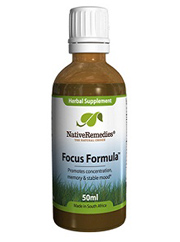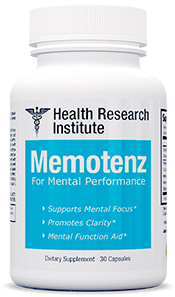Focus Formula Review: Don’t Buy Before You Read This!
User Rating:
41%
 +
-
+
-
What is it?
Focus Formula is a homeopathic ADD remedy and mental performance booster. Its advertising claims that it can help increase focus, attention span, and overall mental performance in both children and adults.
They say that their blend promotes blood flow to the brain, increasing its access to oxygen and nutrients. They recommend Focus Formula to parents of hyperactive children, students looking to boost their grades, and professionals that are trying to get an edge at work.
The most reliable nootropic on the market is Memotenz. It has been shown in multiple trials to dramatically increase memory and cognition in its users, who also have seen growth in their abilities to problem solve, stay focused, and remain happy and productive. Click here to read more about what goes into the manufacturing of Memotenz.
Focus Formula Ingredients and Side Effects
The ingredients in Focus Formula are all prepared in accordance with traditional homeopathic methods, which involve using the whole herb, not just extracts, and putting it through a complicated dilution process. The herbs are crushed, mixed with alcohol, diluted, and tumbled against seashells, which subscribers to homeopathic methods say releases the “natural energies” of the herbs.
This process often tends to dilute the mixture so much that the end tincture barely contains any molecules from the original herb. Homeopaths would say that the “water has a memory” of the presence of the herbs, however there are no accredited scientific studies that support this belief.
Focus Formula is a tincture made from a combination of homeopathic solutions made from the following ingredients:
| Ginkgo Biloba |
Skullcap |
| German Chamomile |
Gotu Kola |
Ginkgo Biloba: One of the most commonly used mental performance aids worldwide. Ginkgo trees were cultivated originally in China, however they are now grown worldwide.
Ginkgo biloba is used primarily to enhance memory, but it is also a helpful circulatory aid. It increases blood flow to the brain, which both improves cognition and helps prevent age-related mental decline.
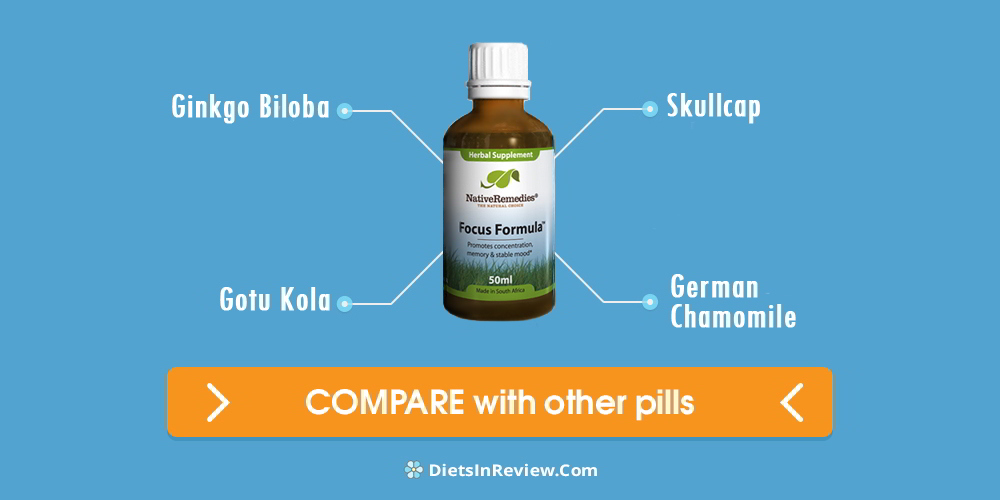
Skullcap: A small, flowering plant somewhat related to mint. Skullcap is used in various home remedies and in Chinese traditional medicine, however there is very little clinical data that supports the idea that it has any therapeutic value.
It is possible that skullcap contains some chemicals that help with dopamine and adrenaline reception in the brain, however there is no data that shows any boost to attention or mental performance in relation to skullcap consumption. It is also not known how safe skullcap is, especially for long term consumption.
German Chamomile: A flowering herb that is frequently used to make a tea. Chamomile is considered a relaxant that can help users deal with anxiety and stress levels. It may also have applications for reducing the symptoms of gastrointestinal distress, however it is possible that these effects are isolated to the tea and may not be seen with oral supplements.
Chamomile is not considered a nootropic by any measure. Its relaxing effects are also considered to be sedating, which is not helpful for overall mental performance. Homeopathic medical texts claim that chamomile may be helpful for ADD, however there is no actual data that backs these claims up.
Chamomile is generally safe, however it comes from a family of flowers that have historically higher allergy rates than other herbs. It is also possible that chamomile may have some negative interactions with estrogen and estrogen medications, so it is not recommended for individuals with hormone sensitivities.
Gotu Kola: A creeping marsh vine that is indigenous to the Indian subcontinent. Gotu Kola, also known as centella, wassernabel, Indian water navelwort, or white rot, has shown the most usefulness for stimulating circulation, and it may also help with wound healing and inflammation.
Gotu Kola should not be confused with Kola nuts, as the two are in no way related and in fact have very different effects on the body. Where kola nuts are stimulants that are high in caffeine, gotu kola is another herb that’s considered a relaxant and anxiolytic.
Gotu is not considered a sedative, and may actually be helpful for increasing alertness and attention span, however they may just be a function of the decrease in anxiety. While gotu kola may help mood and subjective well-being, it has not been shown to have any kind of beneficial effects on learning, recall, thinking speed and accuracy, or most other traditional measures of a nootropic product.
Gotu kola is generally considered safe in the short term, however there have been some concerns raised recently about its long-term dangers. There have been several case studies that suggest it is possible that gotu kola can cause liver damage after prolonged use, however it is not yet known just how risky it may be.
Click here to read more about which nootropics our team of experts recommends for which issues.
Focus Formula Quality of Ingredients
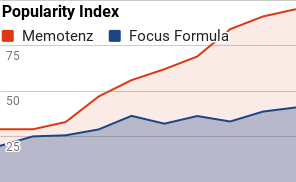 Even if Focus Formula used normal-strength herbs instead of thoroughly diluted homeopathic ones, it would still have an exceptionally weak ingredients blend. The fact that these ingredients are present in such microscopic amounts makes it highly unlikely that they could have any impact on the body, either positive or negative.
Even if Focus Formula used normal-strength herbs instead of thoroughly diluted homeopathic ones, it would still have an exceptionally weak ingredients blend. The fact that these ingredients are present in such microscopic amounts makes it highly unlikely that they could have any impact on the body, either positive or negative.
Ginkgo biloba is considered one of the top nootropic supplement ingredients on the market according to our team of experts, and they highly recommend products that use full-strength versions of ginkgo leaf extracts. Unfortunately, ginkgo is the only ingredient in Focus Formula that is considered a nootropic at all.
All of the other herbs in their blend are formulated for relaxation and anxiety reduction, not the improvement of users’ mental abilities. Their full-strength versions may be helpful for treating some mood-based conditions, however there is currently not enough data to support those applications either.
All of that is beside the point, however, because of how useless homeopathic preparations render the products. There is absolutely no reason to believe the claims that homeopathic procedures “unlock vital energies,” “create positive vibrational frequencies,” or that “water has a memory.”
Homeopathy is a pseudo-science that has never been able to prove its claims with any kind of scientific methodology. Users are encouraged to avoid all products that claim to be prepared using homeopathic procedures, as they will rarely contain bio-available quantities of their contents.
Follow this link to find out how the top brands of nootropic supplements stack up against one another.
The Price and Quality of Focus Formula
In general, homeopathic products tend to be less expensive, given that the dilution procedure allows them to stretch their ingredients farther than traditional supplements can. Focus Formula, however, retails for the following prices:
- 1, 2 fl. oz. bottle of Focus Formula tincture: $38.95
This price is about average for the monthly supply of a more effective nootropic product. It is not clear why Focus Formula is so much more expensive than other homeopathic remedies, however that should not be taken as an indication that it is any more potent than those other products.
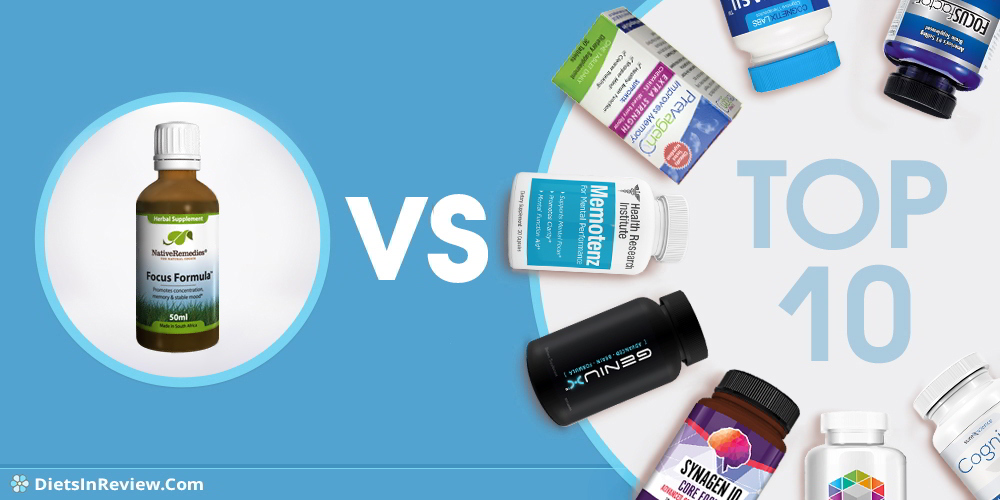
To learn more about which nootropic blends have tested the highest for improving memory function, just click on this link.
Business of Focus Formula
Focus Formula is a product of Native Remedies, a homeopathic products manufacturer and subsidiary of Silver Star Brands, Inc. Their home page lists their contact information as:
Phone Number: (877) 289-1235
Address: 250 City Center
Oshkosh, WI 54906
Email: Native remedies does not provide an email address, however they do have an electronic contact form available through their contact page.
Users should be aware that Silver Star Brands has had numerous products recalled by the FDA for failure to meet safety standards. Their customer feedback rating with the Better Business Bureau also features a vast majority of negative feedback from their previous customers.
For more information about which nootropics will work the best with your particular brain chemistry, follow this link.
Customer Opinions of Focus Formula
There are numerous negative reviews for Focus Formula online from their previous customers. Here are some of their responses, taken from the accounts of their former clients posted online:
“My kids hated the taste and it did nothing. We threw it out after a week.”
“Might as well be tinted water for all the good it did me.”
“Totally turned my son into a zombie. I tried it a few times, and then just trashed the rest.”
The majority of responses from previous users report that it did nothing. There are some accounts of it having a sedative effect on children, such as in the account above, however those are more rare.
Click here to see the top ten nootropic supplements on the market today as ranked by our team of experts.
Conclusion – Does Focus Formula Work?
Focus Formula is a watered-down version of several ingredients that would probably not be that effective in the first place. Only ginkgo biloba is thought to be a useful nootropic ingredient, and the rest of their blend are unproven herbal flowers that have no demonstrated value.
Homeopathic procedures are unscientific and ineffective. While there are still people that will defend them, they are not accredited doctors or scientists and they have no real data to support their claims. Users are strongly urged to avoid any product that claims to have been prepared in accordance with homeopathic methods.
The nootropic that has the best track record with our team of experts is Memotenz. Memotenz has shown in multiple trials that it has powerful effects on memory and cognition that can be seen and felt by its users.
Memotenz is an effective short-term performance booster that also gets more potent the longer users take it. Click here to see all of the reasons that Memotenz is considered so effective by our experts.
Featured Diets


